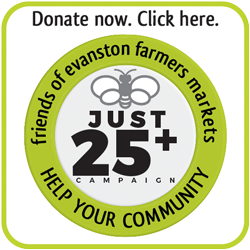There are so many standards of certification, growing terms and other jargon that it is easy to get confused about what you are buying. Until now!
The USDA’s Agricultural Marketing Service offers a tri-fold pamphlet that you can download by clicking here. It was created in partnership with Marin Farmers Markets and the Center for UrbanEducation about Sustainable Agriculture (CUESA).
To save you some time, we’ve reproduced the content right here. Take a deep breath, and read on!
FARMING TERMS
CERTIFIED NATURALLY GROWN:
Certified Naturally Grown (CNG) products are certified by an independent nonprofit organization (not USDA) as having been produced in approximate accordance with national organic standards, a program involving fewer paperwork requirements and lower certification fees for farmers than the USDA’s National Organic Program.
BIODYNAMIC:
Biodynamic farming is based on the work of Austrian philosopher Rudolf Steiner. In addition to organic practices such as crop rotation and composting, biodynamic farmers rely on special plant, animal, and mineral preparations and the rhythmic influences of the sun, moon, planets, and stars.
CONVENTIONAL:
Refers to standard agricultural practices that are wide-spread in the industry. Can (but does not necessarily) include use of pesticides, synthetic fertilizers, “mono-cropping,” antibiotics, hormones and other chemical approaches. Conventional farming in the U.S. may also include the use of Genetically Modified Organisms (GMOs).
DRY-FARMED:
Produce grown using a tilling technique that seeks to retain moisture in the soil and to minimize or eliminate the use of irrigation.
GENETICALLY MODIFIED ORGANISMS (GMOs):
GMOs are plants and animals whose genetic make-up has been altered to exhibit traits that they would not normally have, like longer shelf-life, different color, or resistance to certain chemicals. In general, genes are taken (copied) from one organism that shows a desired trait and transferred into the genetic code of another organism. Genetic modification is currently allowed in conventional farming.
HEIRLOOM:
Heirloom crop varieties, also called farmers’ varieties or traditional varieties, have been developed by farmers through years of cultivation, selection, and seed saving, and passed down through generations. Generally speaking, heirlooms are varieties that have been in existence for a minimum of fifty years.
INTEGRATED PEST MANAGEMENT (IPM):
A pest management strategy that aims to reduce the use of chemical pesticides through careful monitoring for actual pest threats. Pesticides are applied in such a way that they pose the least possible hazard, and are used as a ‘last resort’ when other controls are inadequate.
LOCALLY-GROWN:
Food and other agricultural products that are produced, processed, and sold within a certain region, whether defined by distance, state border, or regional boundaries. The term is unregulated at the national level, meaning that each individual farmers market can define and regulate the term based on their own mission and circumstances.
NATURALLY-GROWN/ALL NATURAL:
USDA guidelines state that all “natural” meat and poultry products can only undergo minimal processing and cannot contain artifi cial colors, artificial flavors, preservatives, or other artificial ingredients. The claim “natural” is otherwise unregulated.
NO SPRAY/PESTICIDE-FREE:
While a farm may not be organic, “no spray” or “pesticide-free” indicates that no pesticides, herbicides, or fungicides have been applied to the crop at any point in its production.
NO-TILL:
A method of reducing soil erosion by planting crops without tilling the soil, which may rely on herbicides to control weeds.
ORGANICALLY-GROWN/CERTIFIED ORGANIC:
All products sold as “organic” must meet the USDA National Organic Program production and handling standards. Certification is mandatory for farmers selling more than $5,000 of organic products per year, and includes annual submission of an organic system plan and inspection of farm fields and processing facilities to verify that organic practices and record keeping are being followed.
SUSTAINABLE AGRICULTURE:
Farming that is socially just, humane, economically viable, and environmentally sound. The term is unregulated.
TRANSITIONAL:
Farmers must practice organic methods for three years on a given piece of land before the products harvested from that land can be sold or labeled as organic. “Transitional” as an unofficial term means that the farmland is in the midst of that transition period towards organic certification.
VINE-RIPENED/TREE-RIPENED:
Fruit that has been allowed to ripen on the vine or tree. Many fruits that are shipped long distances are picked while still unripe and firm, and later treated with ethylene gas at the point of distribution to “ripen” and soften them.
FOOD PROCESSING TERMS
ARTISAN/ARTISANAL:
The terms “artisan” and “artisanal” imply that products are made by hand in small batches.
DRY-AGED:
Meat that is dry-aged is hung in a temperature and humidity controlled room for a period of weeks to develop flavor and tenderness. Most commercially available meat is wet-aged by vacuum packaging.
FARMSTEAD CHEESE:
Farmstead cheeses are made by the same people who farm the animals producing the milk. In other words, a cheese that is “from the farm.”
GAPs:
Good Agricultural Practices (GAPs) are a collection of recommended principles for on-farm production, post-harvest processing, and storage of food that reduce risks of microbial contamination.
RAW:
Foods such as milk, cheeses, cider, vinegar, sauerkraut, or almonds that have not been pasteurized (heated) to a minimum of 145 degrees Fahrenheit. In the U.S., raw milk cheeses are required to be aged for 60 days. In some states, sales of raw milk are prohibited.
SECONDS:
Produce which is bruised, blemished, over-ripe, misshapen, or otherwise deemed unfit for regular sale. Seconds, for cooking or canning, are often available in large quantities and at lower prices.
SULFURED/NO SULFUR:
Many dried fruits are sulfured with sulfur dioxide (S02) or meta bisulfate to keep them from oxidizing during and after the drying process. This preserves their original color and acts as a preservative. Unsulfured fruits are often dark brown in color.
VEGAN:
Foods with this label contain no animal products such as meat, dairy, eggs, gelatin, or honey.
WOOD-FIRED OVEN BREAD:
Breads baked in an oven made of brick, clay or sod that is heated by burning wood.
ANIMAL HUSBANDRY TERMS
CLOSED-HERD:
Closed-herd implies that all animals are bred from the original herd. No animals are purchased to incorporate into the herd.
FREE-RANGE:
Free-range, free-roaming, and pastured imply that a product comes from an animal that was raised unconfined and free to roam. “Free-range” claims on beef and eggs are unregulated, but USDA requires that poultry have access to the outdoors for an undetermined period each day.
GRASS-FED:
The diet of grass-fed animals consists of freshly grazed pasture during the growing season and stored grasses (hay or grass silage) during the winter months or drought conditions. Grass feeding is used with cattle, sheep, goats, and bison.
HERITAGE:
A term applied to breeds of livestock that were bred over time to be well-adapted to local environmental conditions, withstand disease, and survive in harsh environmental conditions. Heritage breeds generally have slow growth rates and long productive lifespans outdoors, making them well-suited for grazing and pasturing.
HUMANE:
If an animal product is labeled “humane,” it implies that the animals were treated with compassion. “Certified Humane” means that the animals were allowed to engage in their natural behaviors; raised with sufficient space where they are able to lie down, shelter and gentle handling to limit stress; and given ample fresh water and a healthy diet without adding antibiotics or hormones. Not all “Humane” claims are regulated.
NO ANTIBIOTICS:
Antibiotics are given to animals such as cows, hogs, sheep, and chickens to prevent or manage diseases. “No antibiotics,” implies that a farmer does not administer antibiotics to his/her animals.
NO HORMONES:
Hormones are commonly used in the commercial farming of animals such as cattle to speed the growth rate or increase milk production. Some of these hormones are natural, some are synthetic, and some are genetically engineered. If a ranch or product professes “no hormones,” this means that they do not engage in these practices. Hormones are not allowed in raising of hogs or poultry.
FARMERS MARKET TERMS
CERTIFIED FARMERS MARKET:
Some states offer or require certification of farmers markets to ensure that the products sold are produced by the farmers themselves. As of 2009, these states include California, Nevada, and Texas. Most of the nation’s producer-only farmers markets establish their own rules and methods of ensuring product integrity at the local level.
SFMNP:
The Senior Farmers Market Nutrition Program (SFMNP) provides eligible low-income seniors with coupons that can be exchanged for fresh fruits, vegetables, honey, and herbs at farmers markets. Funding for the SFMNP is provided by the USDA Food and Nutrition Service to states, U.S. territories, and federally-recognized Indian tribal governments.
WIC FMNP:
The Women, Infants, and Children Farmers Market Nutrition Program provides coupons to eligible low-income women who are pregnant, breastfeeding, and/or caring for children up to five years of age who are found to be at nutritional risk. Coupons are used to buy fresh fruits, vegetables, and herbs at farmers markets. Funding for the WIC FMNP is provided by the USDA Food and Nutrition Service to states, U.S. territories, and federally recognized Indian tribal governments.
EBT:
Electronic Benefits Transfer (EBT) is an electronic system that allows participants in the Supplemental Nutrition Assistance Program (SNAP) to authorize transfer of their government benefits from a federal account to a retailer account to pay for fresh foods. A growing number of farmers markets are equipped with the technology to accept SNAP benefits.
WIC CASH VALUE VOUCHER (CCV):
WIC Cash Value Vouchers, or its equivalent state-sponsored name, allow farmers to accept WIC fruit and vegetable checks at farmers markets, by enrolling them as limited WIC vendors.
This glossary is for educational purposes only. It does not endorse or discredit any of the practices included herein. Created in partnership with Marin Farmers Markets and the Center for Urban Education about Sustainable Agriculture (CUESA).



